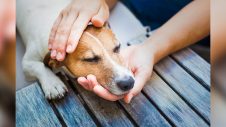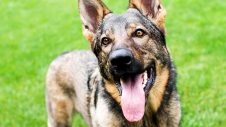What is Osteoarthritis?
Osteoarthritis is a disease condition affecting the joints. The cartilage lining the joint is worn down, causing pain. The symptoms of osteoarthritis can be:
- Pain, stiffness or difficulty when getting up or down;
- Reluctance to climb stairs;
- “Laziness” on walks may be due to arthritic pain
Generally, osteoarthritis is worse at the start of the day when the weather is cooler or after resting. Gentle exercise may lessen the stiffness.
What Causes Osteoarthritis in Cats and Dogs?
Osteoarthritis affects 80% of senior dogs and cats, and can affect younger pets as well.
Osteoarthritis in pets can be caused by many conditions and circumstances. Just like humans, osteoarthritis is most commonly associated with ageing and stress put on joints but can be seen with breed specific conditions where the elbows and or hips are most commonly affected or there are joint related injuries or repeated trauma to the joints.
Excess weight associated with obesity or metabolic diseases such as hypothyroidism, puts pressure on the joint cartilage also contribute. In athletic or working dogs, osteoarthritis is a common disorder due to the repetitive strain and stress those activities put on the body.
Does Osteoarthritis in Cats and Dogs Worsen Over Time?
Osteoarthritis will often take effect slowly and worsen over time. Symptoms will get worse as the joint inflammation worsens, causing greater pain.
Treating Arthritis in Pets
We are fortunate to have many different methods in which we can address pets’ osteoarthritic pain. These include but not limited to;
- Anti-inflammatory medications – these are used to relieve pain and stiffness. We usually see rapid improvement in mobility and reduction in pain.
- Monoclonal Antibody therapy given via a monthly injection has been shown beneficial in both dogs and cats
- Dietary management – specially prepared joint diets are available. These aim to improve joint comfort, reduce cartilage loss and maintain a healthy weight. Such diets can include Hills Mobility J/D and Royal Canin joint care.
- Joint supplements, fish oils – these capsules, powders and liquids are designed to add to your pet’s current diet. Please ask you veterinarian which supplement they would recommend for your pet.
- Pentosan injections as detailed below
- Weight loss (if appropriate) will lessen the stress on the joints and decrease ongoing damage. You can ask your veterinarian what your pet’s ideal weight is.
- Exercise which stresses the joints, such as jumping, ball chasing and running Stressful exercise will aggravate the arthritic joints. Walking and swimming are the best exercise to strengthen the muscles with minimal stress on the joints.
- Acupuncture and trigger point therapy have also shown to provide some good results when treating dogs and cats with osteoarthritis
Pentosan Injections for Dogs and Cats
Used in combination with the above, these act to protect the joint cartilage by –
- Limiting cartilage deterioration;
- Promoting new cartilage formation;
- Thickening the joint fluid – thus acting as a better lubricant;
- Improving blood supply to the joint, in turn helping it heal;
- By virtue of these actions, it aims to provides pain relief for a much longer period of time;
- Treats all joints of the body at the same time.
Using Pentosan
Pentosan is administered as a course of 4 once-weekly injections. This course of treatment can be repeated every 6-12 months as needed under the supervision of your vet. Pentosan is also known as Cartrophen, Zydax and Synovan.
Arthritis FAQs
Can you prevent osteoarthritis in dogs?
Whilst there are no steps that can guarantee the prevention of osteoarthritis, managing your pet’s weight and activity can help minimise and manage the risks. A healthy weight is the most impactful way to reduce arthritis and its severity. Obesity in our pets causes unnecessary stress on their joints and cartilage, increasing the risk and severity of arthritis.
Can we cure the arthritis?
Whilst there is no cure for arthritis, the effects of the disease can be minimised through medications and lifestyle changes.
Anti-Inflammatory Medications
As osteoarthritis is a degenerative condition leading to joint pain and inflammation, your trusted Greencross Vet can provide medication options available to lessen the symptoms of arthritis.
Weight Management
By keeping your pet’s weight within a healthy range, you can both prevent and minimise the effects of osteoarthritis by limiting the excess stress on their joints. Greencross Vets can provide weight management and nutrition support to help keep your pets healthy.
Limited Exercise
Whilst exercise is an important part of keeping our pets healthy, for dogs struggling with osteoarthritis, excess exercise can be harmful. It is important to exercise in moderation with low impact exercise so you don’t worsen inflammation or cause pain.
Supportive environment
As the osteoarthritis is likely to impact your pet’s mobility, you can create a supportive and osteoarthritis-friendly environment for them to move around in. This can mean modifying your home to limit the amount of strain required to move around. Often providing ramps, carpet runners and other non-slip flooring, can minimise the risk of injury and flare ups.
If you’re concerned that your dog or cat may be suffering from arthritis, book an appointment with your local Greencross Vet now.

 Greencross Vets
Greencross Vets 











